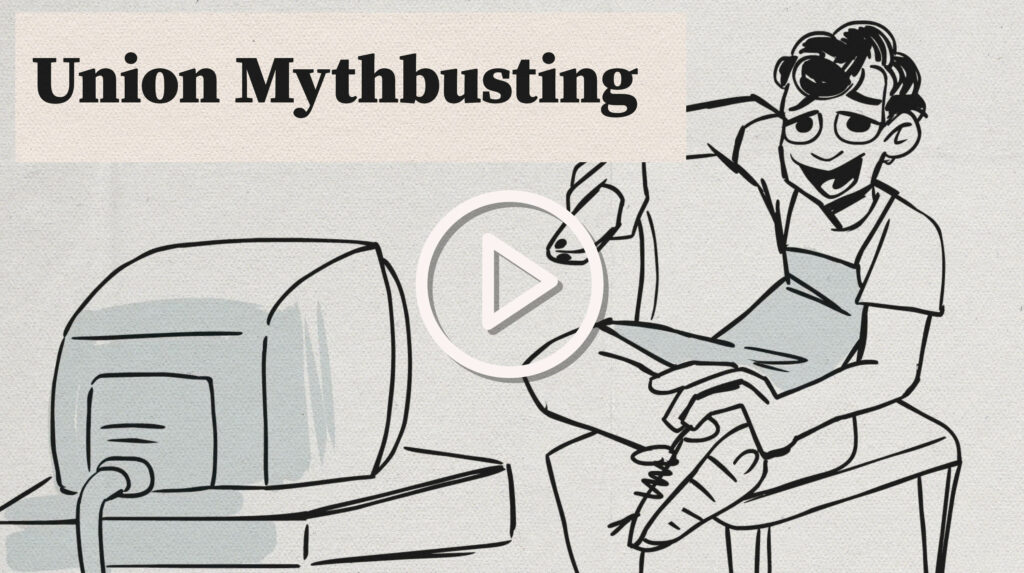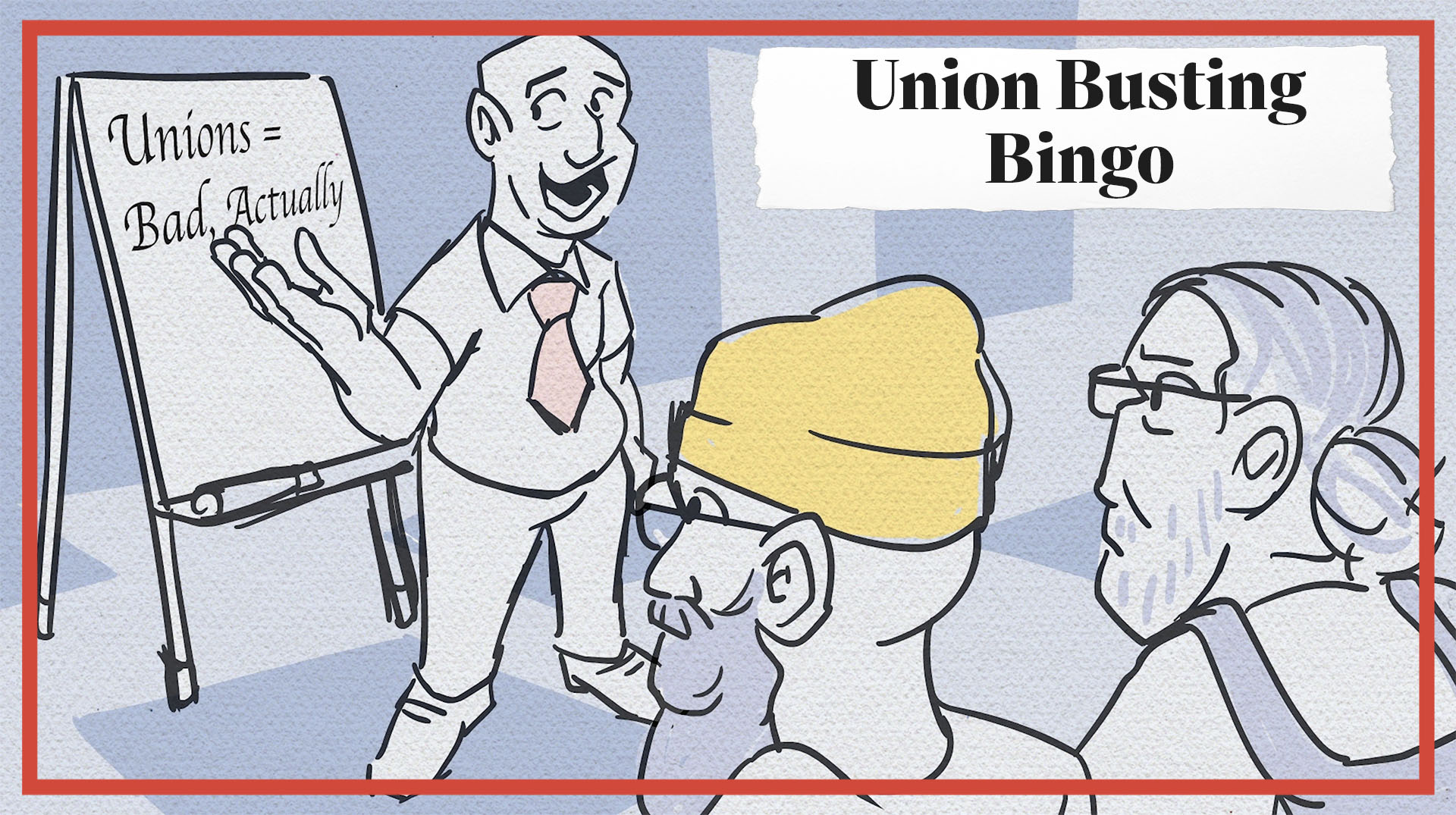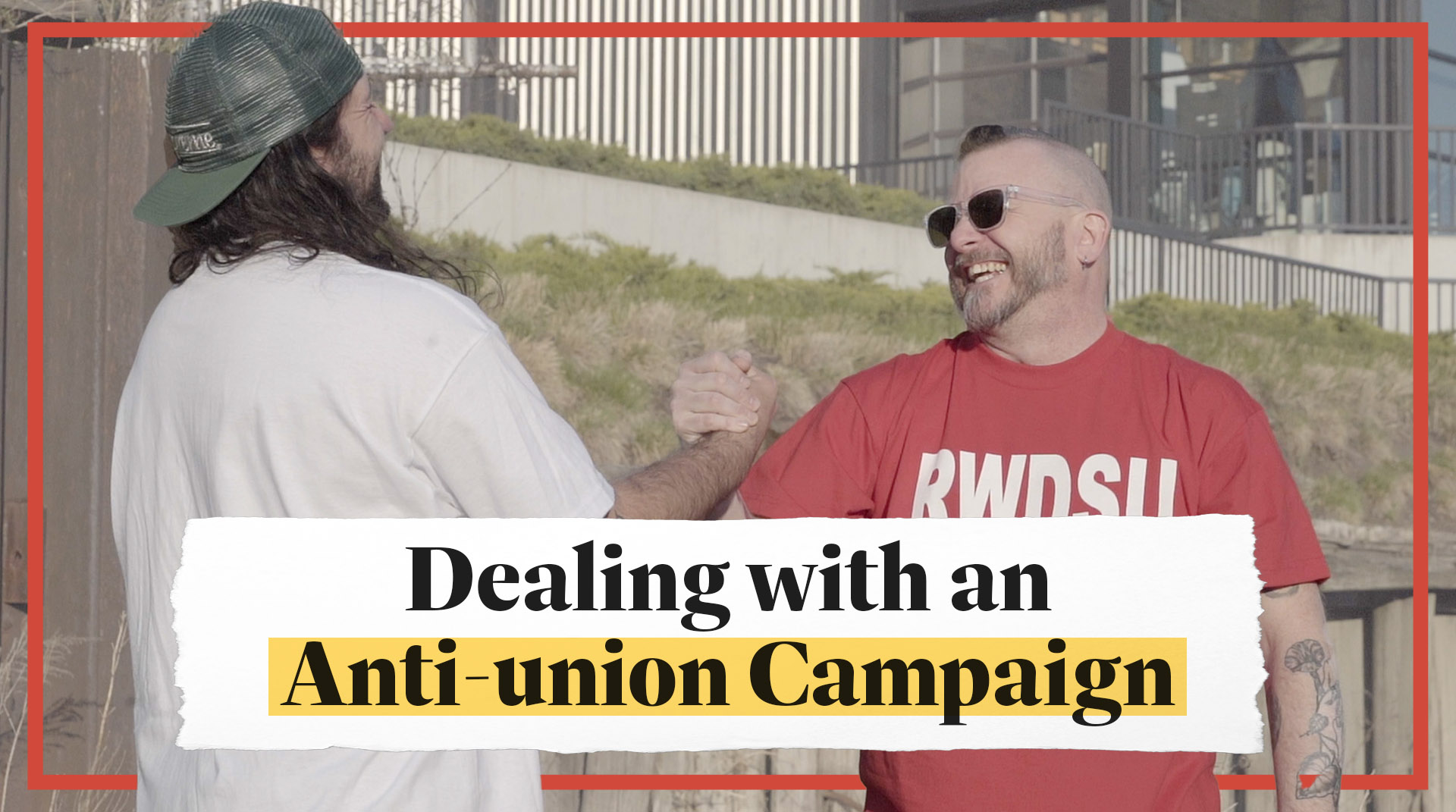Most companies do not want their employees to unionize their workplace.
Without a union, your employer has all the say in how you work, how you’re compensated for it, and so much more. Because of all that, they will likely not just oppose a union at your workplace, they will also try to stop your efforts to organize.
Union busting is what we call the series of tactics your company will do to stop you from starting a union at your workplace. The tricks and threats they’ll use to gaslight you and your coworkers will vary based on what they think will work — and what their highly paid anti-union lawyers will tell them to do.
But we’ve seen companies pull the same tactics enough times to know what to expect from union busting campaigns, and the more you and your coworkers are prepared for these union busting tactics, the less likely they will be to impact your union campaign.
What your company will say:
The first thing to know is that not every union-busting conversation your managers try to have will be negative — in fact, most of the things they’ll start to say to you will be very positive. Here are some of the lines you’ll hear when they try to stress how unnecessary your union is:
“We’re a family here.”
“Unions may be necessary at some workplaces, but ours is different!”
“We have an open door to have any conversation you need.”
“We recognize we made some mistakes but we are fixing things.”
“If you have a problem, we can solve it without a union.”
But if love-bombing doesn’t work, employers also can and will go negative during a union campaign too. Here are just a few of the most common negative talking points you’ll hear managers throw around to discourage you and your coworkers:
“The union can’t guarantee any of the things it says you can get by organizing.”
“If you unionize, we may have to close the business.”
“You could lose all your benefits if you choose to unionize.”
“A union isn’t in your best interest.”
“All unions want to do is your dues.”
“You won’t be able to talk directly to your manager with a union.”
“You may lose your job if the union wins.”
We’ve heard all of this before, but when your coworkers hear it from your boss first, it could really psych them out as you build your union. That’s why it’s helpful to get in front of these talking points ahead of time — check out our Union Mythbusting page for more company talking points and how easy they are to debunk!
What your company will do:
Captive audience meetings
You can expect to hear all of those talking points above in unsolicited conversations that managers try to have with you, but you’ll also hear them in more formal settings like work meetings too. Sometimes, they’ll go so far as to call mandatory meetings to pummel you with anti-union misinformation in what we call a captive audience meeting.
These meetings can be some of the most uncomfortable moments of your union drive, but the more you know about how they work, the easier they are to sit through. Watch the video below to learn more about captive audience meetings and how you can weaken their impact against your campaign:
Dealing with Captive Audience Meetings
Want a copy of our union busting bingo sheet to print out to play during your captive audience meetings? Click here to download our PDF!
Retaliation
Employers will also try to discourage their workers’ union efforts by retaliating against known union supporters. This can be something as blatant as firing a union supporter, or as subtle as cutting hours or other negative changes in behavior.
In any case, such anti-union retaliation is also illegal, as it violates your rights under the NLRA to organize your workplace.
When you or your coworkers experience retaliation against your employer for union activity, it’s crucial that you document both the details and the timeline of the actions in question. When you work with our union organizers, part of their job will be to document this for you and your coworkers.
If you’re worried about facing retaliation, you should be building your case to prove that you were working the way you were expected to: by documenting your own work habits compared to your coworkers not participating in union activity.
So if you suspect management is targeting you or your coworkers, you’ll want to start on this ASAP; and the more information you have to work with, the better case you have to prove illegal wrongdoing.
Division
If your company is clever, they won’t make the mistake of making managers do all the work to pressure you and your coworkers — instead, they’ll use the anxiety of your coworkers who are concerned about your union.
When someone has concerns about the union you’re building at work, and management talks to them about it first, the company may weaponize that worker’s fears by turning them into an advocate against your union.
Management will be mapping who they think are pro and anti union just like we do when organizing, and if they assess enough of the people who are anxious about your union, they can create an “us vs. them” narrative that sews far greater divisions at your workplace.
Not everyone will be pro-union, no matter how much you talk to them — but being sincere and sensitive in how you talk to your coworkers who are worried about your union will help them avoid falling for the company’s narrative here.
Make it clear that this isn’t about being “pro-union” vs. “pro-company”, and that you all are joining together to unionize because you care about your workplace and you want to see a version of it that works for everybody.
Pizza parties, one-time bonuses, and more
But like we mentioned earlier, not every union-busting tactic is negative — in fact, a lot of what a company will do during a union busting campaign will be to sweeten their reputation at your workplace going into a union election.
You may notice that all of a sudden, after your union goes public, your management will become very generous with things like employee appreciation parties — the dreaded break room pizza party is the most classic stereotype of this kind of union busting.
But employers will do more than that to butter you and your coworkers up before your union election: companies often give out one-time raises or bonuses and change policies to offer token reforms to their workers to demonstrate that “they are listening” and that you don’t need a union to change things at work. They’ll even tell you that you’ll get these incentives for voting against your union — but those kinds of promises and bribes are also illegal for employers to do, per the NLRA.
This is all you have to keep in mind when this happens: if the threat of a union is what it takes to get small improvements like these at your workplace, imagine what you can get done when you have a union and can negotiate directly for a contract with your employer.
How you can deal with union busting:
Be strategic as you organize
The most important thing you can do to deal with union busting from your employer is to give yourself as much time as possible to organize your workplace before they learn about your campaign in the first place.
This means planning setting up convos with your coworkers in a way that limits the risk of management finding out about your union before you’ve had chance to talk to all your coworkers about it.
Be conscious of how you begin conversations with coworkers at the start of your campaign, and use workplace mapping to your advantage to make sure you build support for your union as strategically as possible.
Educate and prepare yourself and your coworkers
Once you all have made a solid base of support for your union, it is important to prepare yourselves for all of the things that management will say and do to bust your union once you go public.
How to Beat Union Busters
As you continue to talk to your coworkers about your union, inform each other of all of these union busting tactics, and take time to prepare each other with roleplay scenarios of these situations, so that they can be prepared for how tense some of these things can feel when they’re really happening.
Union busting is meant to make the unionization process painful, and it will make you and your organizing committee experience self-doubt. But the more you prepare yourselves for that, the less effective it will be.
Know your rights
What’s just as important as knowing what union busting tactics you and your coworkers might face during your union drive? You should also know your protected rights to organize under the National Labor Relations Act (NLRA).
Our Know Your Rights page goes over how the NLRA protects what you can say and do to organize your workplace, and on the flip side how that limits what your employer can say and do to stop you.
Document, document, document
Remember that of all the things we’ve talked about your employer saying and doing to bust your union, many of them are flat-out illegal!
When you work with our union organizers, we’ll help you document every time your employer says or does something that could be considered a violation of the NLRA. It’s important to cover the who, where, when, and how of each offense — as well as how non-public supporters are treated by management in comparison. All of this information could be crucial if you have to file an unfair labor practice charge with your employer later on during your campaign.
Have each other’s backs
The reason employers do all of these things is because it works when you don’t see it coming. All of the strain that these tactics put on your workplace can make even the most eager union supporter want to do whatever it takes to make all of that pressure stop.
The more your coworkers check in on each other once the company’s anti-union campaign begins, the more you will be able to gauge how the union busting is impacting all of you. Stay connected with your organizing committee and have a plan to keep your union’s momentum strong as you approach your election day.
Unionize Your Workplace
Are you and your coworkers ready to negotiate for bigger raises, stronger benefits, and better lives? If so, the steps to start a union with UFCW are simple.




